News des IPT
Dezember 2025
Prof. Stefan Engelhardt wurde mit der Heinz-Maier-Leibnitz-Medaille ausgezeichnet, der höchsten wissenschaftlichen Ehrung der TUM. Diese prestigeträchtige Auszeichnung wurde vier herausragenden Forschern von den Vizepräsidenten der TUM, Prof. Juliane Winkelmann und Prof. Gerhard Kramer, überreicht.
© Andreas Heddergott, TUM
Oktober 2025
Herzlichen Glückwunsch an Niklas und Xinyue, die beim TRR267 Retreat in Würzburg den 1. und 2. Preis für ihre Poster gewonnen haben.
September 2025
Auf der DZHK-Jahrestagung 2025 in Heidelberg gewann Gheo Idrissou den Preis für den besten Rapid-Fire Talk zum Thema: "Identification, prioritization and validation of functionally relevant long non-coding RNAs in human cardiomyocytes"
© Peter Kiefer, DZHK
März 2025
Karin Ziegler gewann den Posterpreis auf der 22. deutsch-niederländischen Tagung der Arbeitsgruppen für Molekulare Kardiologie für ihr Poster zum Thema “Sympathetic ganglionic inflammation in cardiac disease: implications for therapeutic intervention”.
September 2024
Auf der DZHK-Jahrestagung 2024 in Frankfurt gewann Niklas Petzold den Posterpreis.
Juli 2024
Tatiana Abikeeva wurde mit dem Young Investigator Merit Award ausgezeichnet, der pro Generation an einen herausragenden Doktoranden innerhalb des GRK2338 vergeben wird, um seine Leistungen zu würdigen und seine Zukunft in der Wissenschaft zu unterstützen.
März 2024
Dr. Dr. Karin Ziegler wurde auf dem 9. Deutschen Pharm-Tox-Gipfel mit dem Fritz Külz Preis ausgezeichnet. Der Fritz Külz Preis wird alle zwei Jahre von der Deutschen Gesellschaft für Experimentelle und Klinische Pharmakologie und Toxikologie (DGPT) verliehen und ist die höchste Auszeichnung der DGPT für junge Wissenschaftler.
Sarah Hölzl gewann den Posterpreis auf der Jahrestagung 2024 der Deutschen Gesellschaft für Pharmakologie und Toxikologie für ihr Poster zum Thema "Elucidating missing X factors to understand sex bias in cardiovascular disease”.
November 2023
Daniel Andergassen, unabhängiger Nachwuchsgruppenleiter am Institut für Pharmakologie und Toxikologie der Technischen Universität München, erhält einen renommierten Starting Grant des Europäischen Forschungsrates (ERC). Damit wird ein ambitioniertes Forschungsprojekt gefördert. Ziel ist es, die molekularen Mechanismen zu verstehen, die den geschlechtsspezifischen Unterschieden bei Herzinsuffizienz zugrunde liegen. Besonderes Augenmerk gilt den Genen, die bei Frauen der X-Chromosom Inaktivierung entgehen, was zu einer höheren Gen-Dosis im Vergleich zu Männern führt. Diese grundlegende Forschung erweitert unser Verständnis der molekularen Mechanismen, die zu geschlechtsspezifischen Unterschieden bei Herzinsuffizienz führen, und zielt darauf ab, RNA-basierte Therapien für geschlechtsspezifische Behandlungen zu entwickeln.
Oktober 2023
Dr. Karin Ziegler erhielt den August Wilhelm und Lieselotte Becht Forschungspreis 2023 für herausragende Forschungsarbeiten auf dem Gebiet der patientenorientierten Herz-Kreislauf-Forschung der DGK Herztage.
Offizieller Text (link is external)

September 2023
Niklas Petzold hat für sein Poster “Identification of key lncRNAs in cardiac resident macrophages using pooled CRISPR screens” den Posterpreis beim Young-DZHK retreat 2023 in Potsdam gewonnen.
Juli 2023
Trimannose-coupled antimiR-21 for macrophage-targeted inhalation treatment of acute inflammatory lung damage
Recent studies of severe acute inflammatory lung disease including COVID-19 identify macrophages to drive pulmonary hyperinflammation and long-term damage such as fibrosis. Here, we report on the development of a first-in-class, carbohydrate-coupled inhibitor of microRNA-21 (RCS-21), as a therapeutic means against pulmonary hyperinflammation and fibrosis. MicroRNA-21 is among the strongest upregulated microRNAs in human COVID-19 and in mice with acute inflammatory lung damage, and it is the strongest expressed microRNA in pulmonary macrophages. Chemical linkage of a microRNA-21 inhibitor to trimannose achieves rapid and specific delivery to macrophages upon inhalation in mice. RCS-21 reverses pathological activation of macrophages and prevents pulmonary dysfunction and fibrosis after acute lung damage in mice. In human lung tissue infected with SARS-CoV-2 ex vivo, RCS-21 effectively prevents the exaggerated inflammatory response. Our data imply trimannose-coupling for effective and selective delivery of inhaled oligonucleotides to pulmonary macrophages and report on a first mannose-coupled candidate therapeutic for COVID-19.
Juli 2023
Ursache für Schlafstörungen bei Herzkrankheiten identifiziert
Immune-mediated denervation of the pineal gland underlies sleep disturbance in cardiac disease. Ziegler et al., 2023.
Ein Team um Professor Stefan Engelhardt, Leiter des Lehrstuhls für Pharmakologie und Toxikologie an der Technischen Universität München (TUM), und Erstautorin Karin A. Ziegler hat nun eine direkte Folge von Schlafstörungen bei Patienten mit Herz-Kreislauf-Erkrankungen identifiziert.
Around one third of people with heart disease suffer from sleep problems. In a paper published in the journal Science, a team at the Technical University of Munich (TUM) shows that heart diseases affect the production of the sleep hormone melatonin in the pineal gland. The link between the two organs is a ganglion in the neck region. The study demonstrates a previously unknown role of ganglia and points to possible treatments.
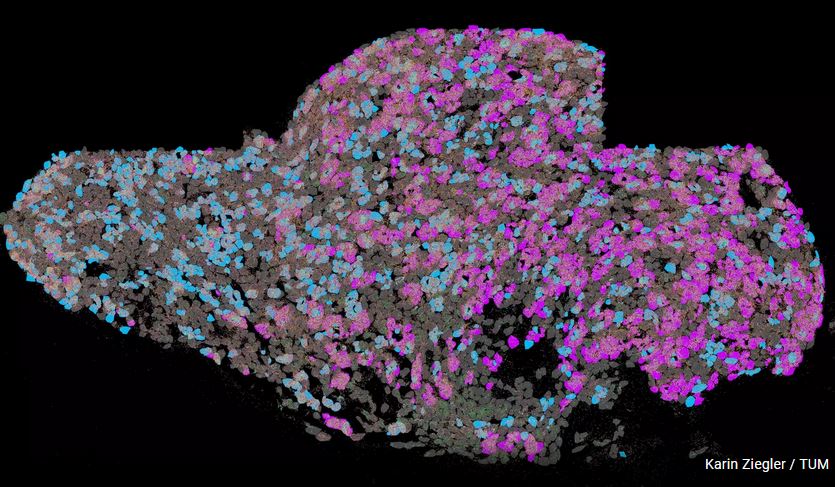
Juli 2022

Neuer DZHK-Nachwuchsgruppenleiter verfolgt Spur der „entflohenen“ Gene
Viele Krankheiten verlaufen bei Frauen und Männern anders. Schon bei der Entstehung gibt es häufig Unterschiede. Das gilt auch für Herz-Kreislauf-Erkrankungen. Woran das liegt, ist bisher nicht geklärt. Dr. Daniel Andergassen vermutet, dass ein Teil der Antwort auf den Geschlechtschromosomen liegt. Mit seiner eigenen Nachwuchsgruppe, die vom DZHK finanziert wird, will er seiner Vermutung in den nächsten sechs Jahren an der Technischen Universität München (TUM) nachgehen.
For more information, click here. (link is external)
Januar 2022
Ministry promotes development of Covid-19 drug: A spray against lung damage in Corona
rnatics, a start-up at the Technical University of Munich (TUM), has developed an RNA-based agent to prevent inflammatory lung damage. These occur particularly in severe corona processes. The German Federal Ministry of Education and Research (BMBF) is supporting further development of the drug with around 7 million euros. The rnatics team is focusing on a substance that blocks proinflammatory microRNA.
For more information, click here. (link is external)
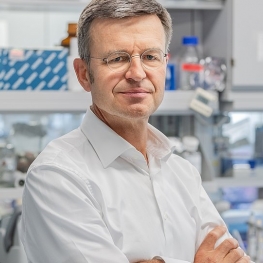
Epigenetic mechanisms for parent-specific genetic activation decoded - Unmuting the genome
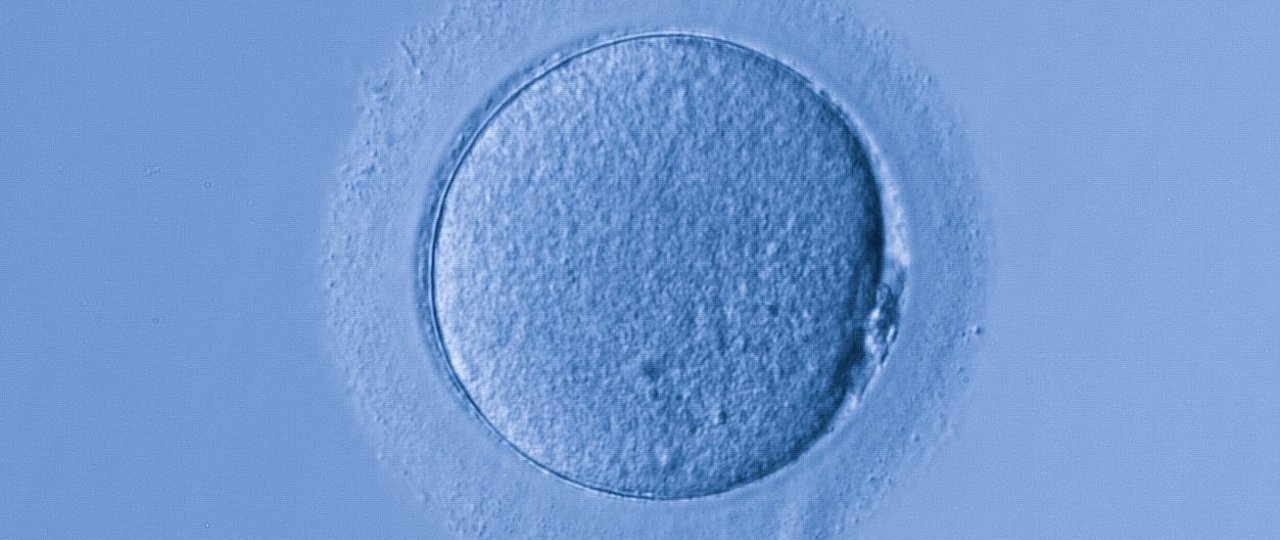
Hereditary diseases as well as cancers and cardiovascular diseases may be associated with a phenomenon known as genomic imprinting, in which only the maternally or paternally inherited gene is active. An international research team involving scientists at the Technical University of Munich (TUM), the Max Planck Institute for Molecular Genetics (MPIMG) in Berlin and Harvard University in Cambridge (USA) has now investigated the mechanisms responsible for the deactivation of the genes.
For more information, click here.(link is external)
A small RNA allows for therapeutic modulation of cardiac arrhythmias
Dena Esfandyari and colleagues discovered a crucial role of microRNA-365 (miR-365) in regulating human cardiac action potential. An abnormal cardiac action potential may lead to different types of life-threatening arrhythmias. This study suggests that miR-365 normalizes the pathologically altered action potential by modulating key cardiac repolarizing channels. These findings have been recently published in Nature Communications(link is external).

Dezember 2021

Die Deutsche Gesellschaft für Kardiologie (DGK) hat Sönke Michel das Otto-Hess-Stipendium für die Durchführung seiner Doktorarbeit verliehen. Das Otto-Hess-Stipendium unterstützt exzellente MD-Forschungsprojekte
November 2021
SFB Project Retreat 2021 in Alpbach
From November 11th to 13th about 80 scientists from SFB TRR 267 were meeting in Alpbach for the annual project retreat. The impressive scenery fo the Alpbachtal created an ideal atmosphere for scientific exchange and networking within a variety of project presentations, poster sessions as well as the supporting framework program.
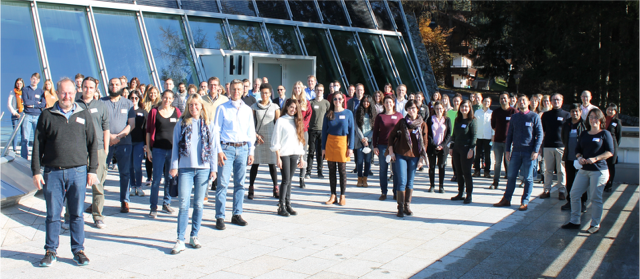
Oktober 2021
Hans-Jürgen-Bretschneider-Abstract-Prize at the DGK Herztage 2021
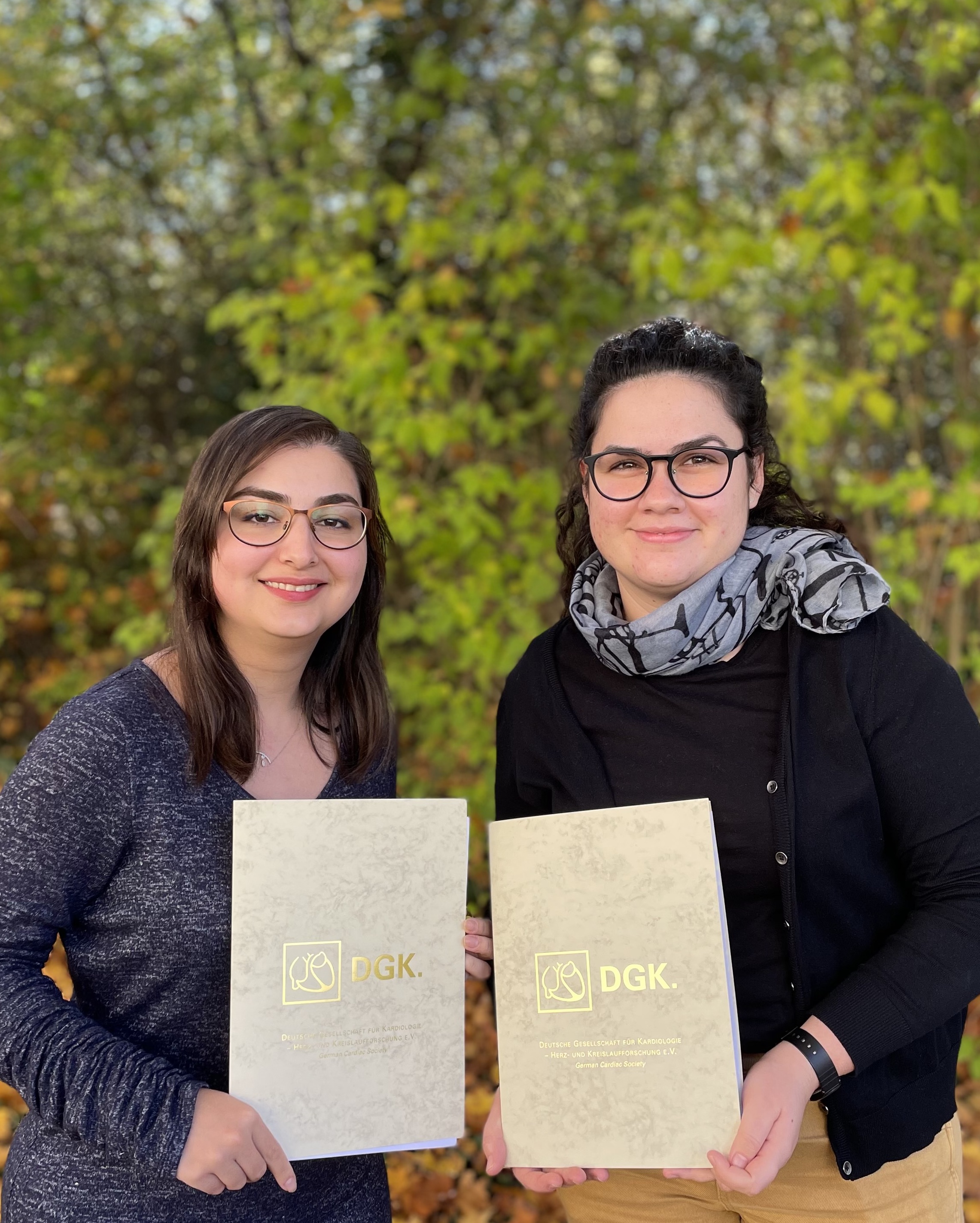
Mai 2021
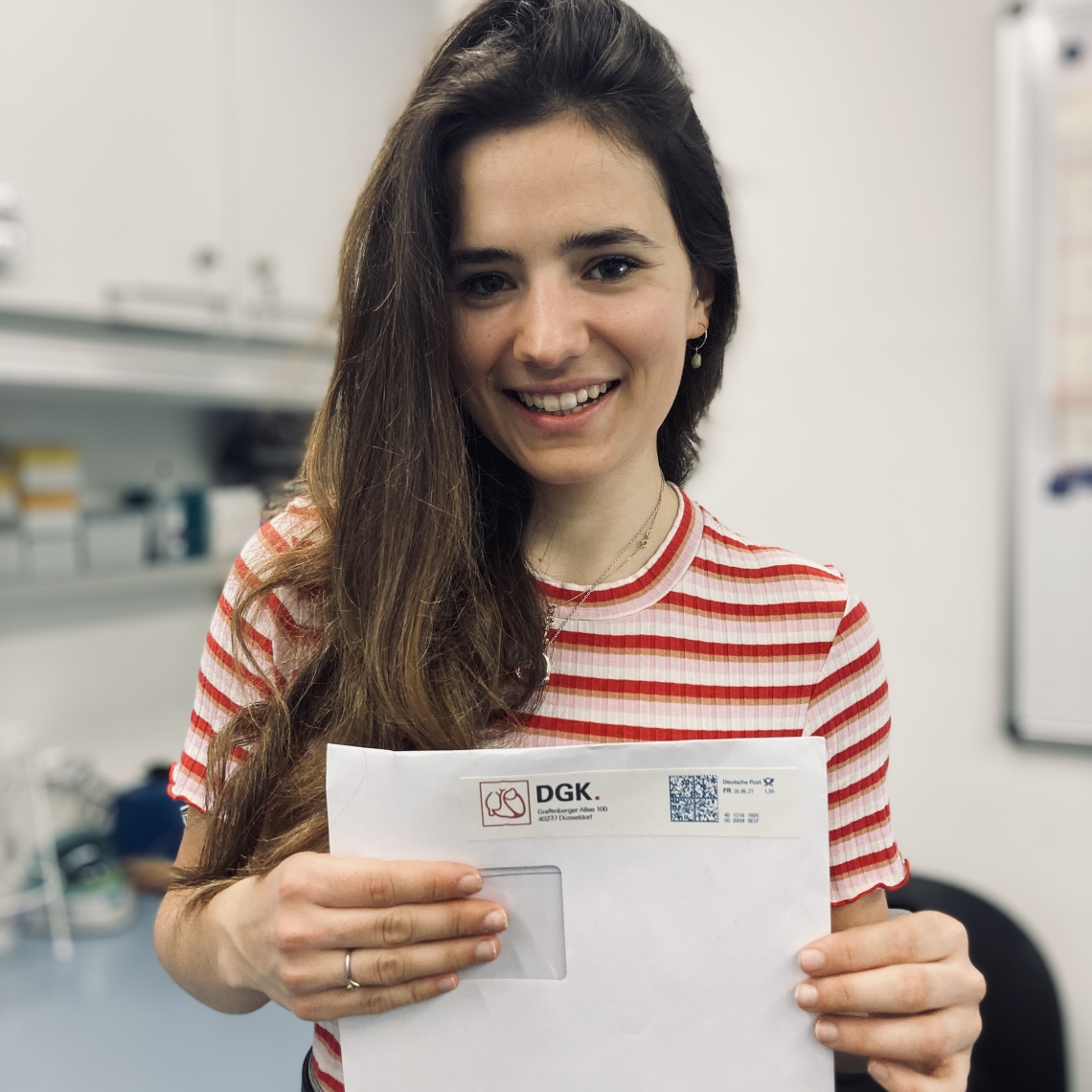
Otto-Hess Stipendium für Luisa Gündel
Die Deutsche Gesellschaft für Kardiologie (DGK) hat Luisa Gündel das Otto-Hess-Stipendium für die Durchführung ihrer Doktorarbeit verliehen. Mit dem Otto-Hess-Stipendium werden exzellente Forschungsprojekte im Bereich der Medizin gefördert.
März 2021
Posterpreis beim PharmTox Summit
Paula Vaccarello gewann den Posterpreis auf der Jahrestagung 2021 der Deutschen Gesellschaft für Pharmakologie und Toxikologie für ihr Poster zum Thema "MicroRNA-21 als potenzielles therapeutisches Ziel bei idiopathischer Lungenfibrose".
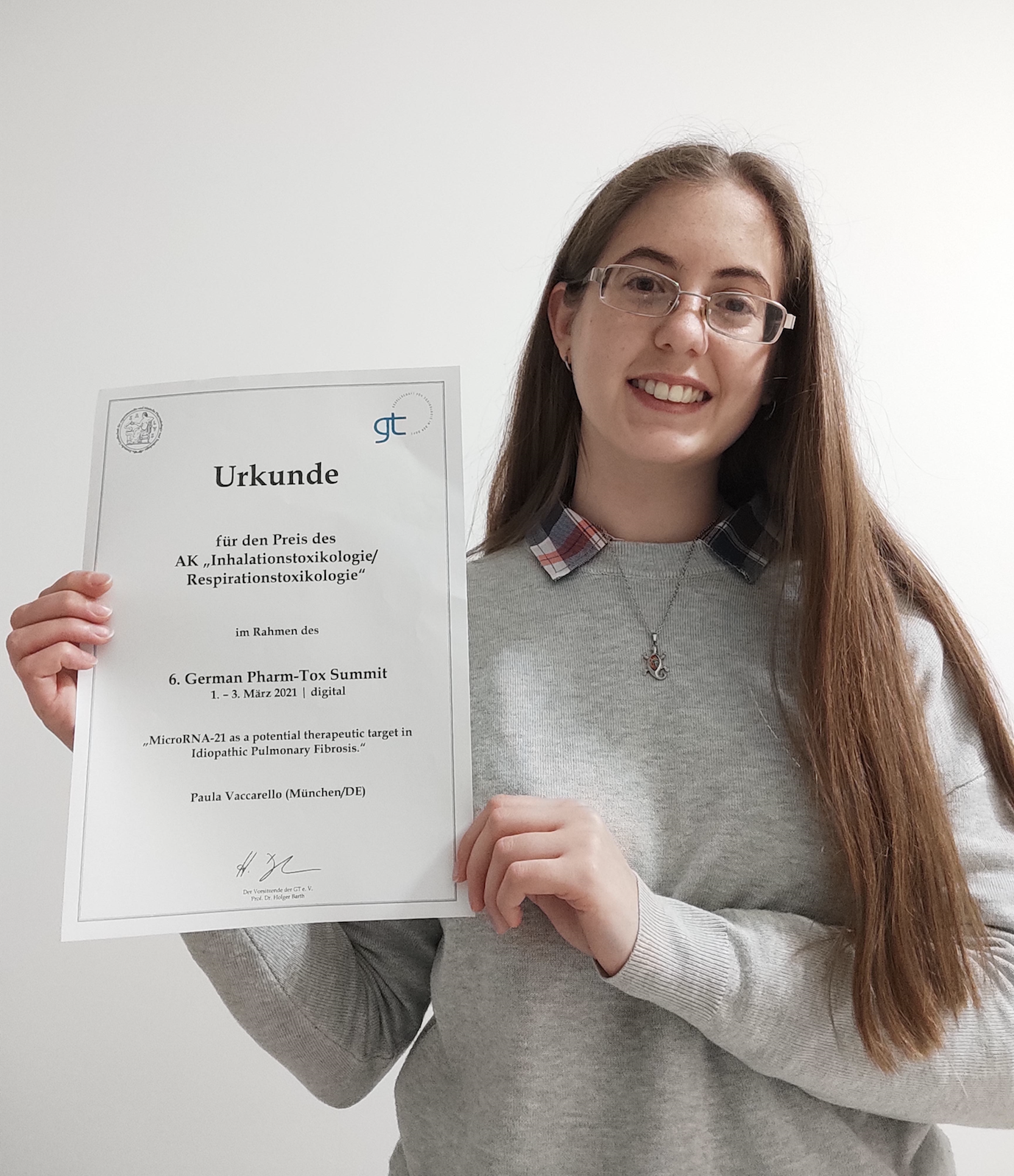
Februar 2021
A macrophage small RNA promotes cardiac fibrosis
Deepak Ramanujam and Anna Patricia Schön from the IPT have hitherto discovered a previously unknown molecular function of microRNA-21 (miR-21) that promotes fibrosis through its action in macrophages. This study suggests that macrophages hold promise as target cells for RNA-based therapy against miR-21. These findings have recently been published in the #1 Cardiovascular Journal Circulation(link is external).
October 2020
Bavarian Research Foundation funding for Covid-19 research: (link is external)
Inhalation spray agains pulmonary fibrosis after COVID-19
Patients who have had Covid-19 often suffer from reduced lung function for a long time afterwards. One cause of this is scarring of the lung tissue, known as pulmonary fibrosis. A small endogenous RNA molecule, microRNA, is suspected of driving this disease process. Synthetically produced inhibitors (anti-miR oligonucleotides) that neutralize microRNA would be a promising therapeutic strategy. However, when administered intravenously, the drug often does not reach the cells of the organ in question. In the case of the lung, the affected cells can be reached directly by inhalation.
The aim of the "Anti-miR against Pulmonary Fibrosis" project, headed by Stefan Engelhardt, Professor of Pharmacology and Toxicology at TUM, is to develop an inhalation method with the project partner Isar Bioscience GmbH, with which locally high drug concentrations can be achieved in the lungs. This should prevent the development of pulmonary fibrosis as a consequence of covid-19 disease.
April 2020
Next step towards RNA-based therapy of heart failure:
In a collaborative effort, Rabea Hinkel (MRI TUM) and Deepak Ramanujan from the IPT successfully demonstrated the efficacy of synthetic inhibitors of microRNA miR-21 in a pig model for myocardial ischemia. Recapitulating the situation in human patients where, after myocardial infarction, dysregulation of microRNAs contributes to pathologic cardiac hypertrophy and fibrosis, they showed that inhibition of miR-21 significantly ameliorates the phenotype. Their publication in JACC, entitled „AntimiR-21 Prevents Myocardial Dysfunction in a Pig Model of Ischemia/Reperfusion Injury“, was selected as the Paper of the Month by the German center for Cardiovascular Research (DZHK).
March 2020
Poster prize at PharmTox Summit
Christina Beck won a poster prize at the 2020 Annual Meeting of the German Society of Pharmacology and Toxicology for her Poster on "Inhibition of miR-21 mediates cardioprotection by preferential target regulation in non-myocytes".
October 2019
Otto-Hess poster prize
Congratulations to Anna Patricia Schön for receiving the 1st place of the Otto-Hess poster prize 2019 and to Christina Beck for winning the 1st place Hans-Jürgen-Bretschneider poster prize 2019 awarded by the Deutsche Gesellschaft für Kardiologie.

May 2019
The German Research Foundation funds research into molecular regulation in the cardiovascular system
The German Research foundation has approved funding for a new collaborative research center ("Sonderforschungsbereich", short "SFB") at the behest of the Technical University of Munich (TUM), Goethe University Frankfurt and other partners. Over the next four years, the 30-partner consortium will investigate the role of non-coding RNAs in the cardiovascular system and will receive funding around 11 million euros of this purpose.
www.tum.de/nc/en/about-tum/news/press-releases/details/35465/(link is external)
Otto-Hess scholarship for Paula Uibel
MD student Paula Uibel has been awarded the Otto-Hess scholarship for 2019. The Otto-Hess scholarship awarded by the Deutsche Gesellschaft für Herz- und Kreislaufforschung (DKG) supports excellent MD research projects
February 2019
Poster prize
Christina Beck won one out of three poster prizes at the 2019 Annual Meeting of the German Society of Pharmacology and Toxicology for her Poster on "Argonaute immunoprecipitation and RNA sequencing to identify the targets of microRNAs-21 and -29 in the mammalian heart"
January 2019
Chair of Pharmacology and Toxicology at Salzburg University for Antonio Sarikas
Antonio Sarikas, group leader at the IPT since 2009 has accepted an offer by the Medical University of Salzburg (Austria) as Chair of Pharmacology and Toxicology. He starts January 2019 and we are actively looking for a successor.
December 2018
DGK Stipend for Karin Ziegler
Karin Ziegler has been awarded the 2018 DGK stipend for her project on "Characerization of the symathetic control of cardiac immune cells".
November 2018
Congratulation to Anna Patricia Schön for receiving the Segnitz-Ackermann prize awarded by the Deutsche Stiftung für Herzforschung!
The award ceremony was at the DGK Basic science meeting in October 2018 in Berlin.
Quelle: "DGK/Stefan Erhard"
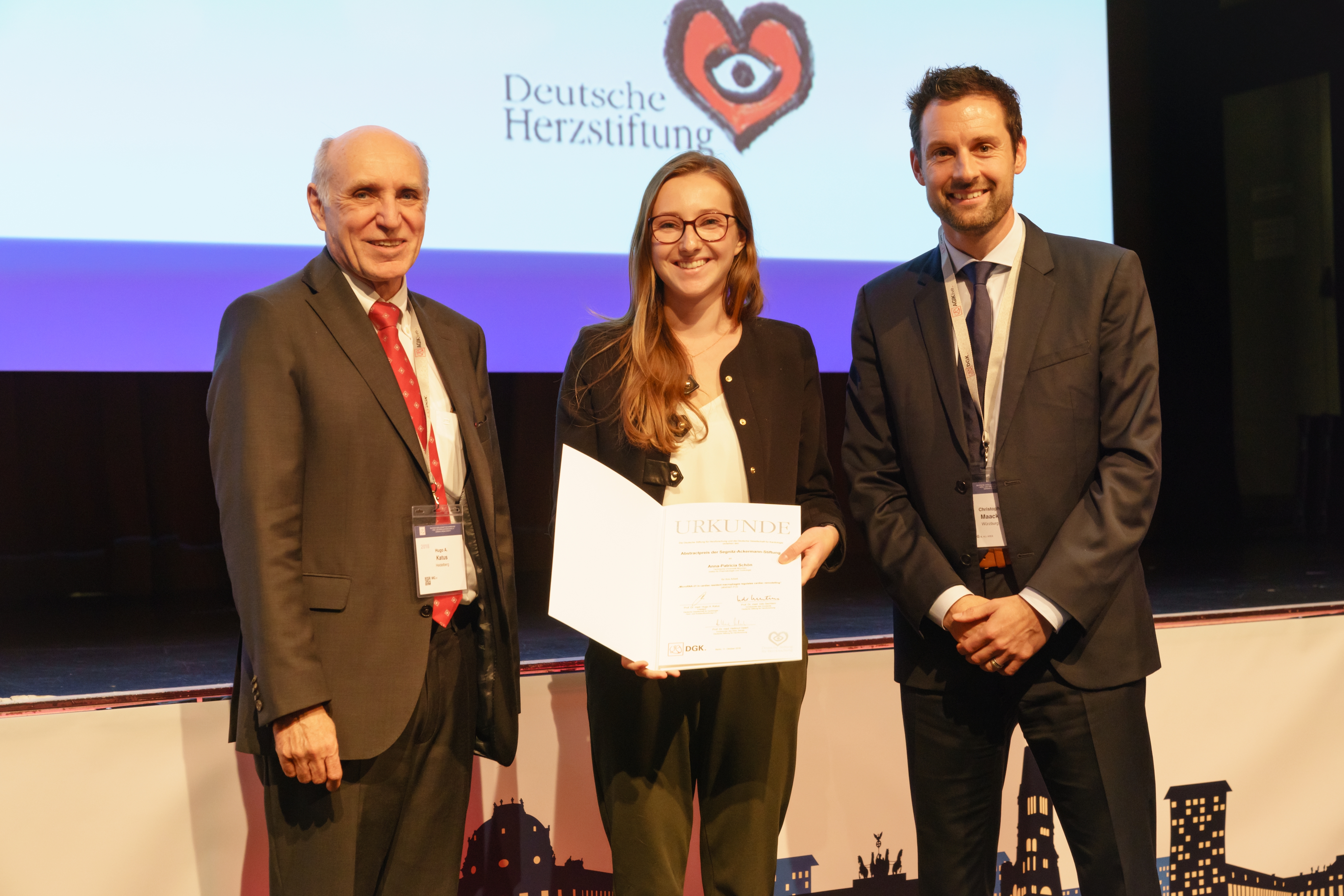
April 2017
Otto-Hess poster prize
Congrats to Karin Ziegler on winning the first place of the Otto-Hess-Poster prize! She received the award for the best poster presentation in the Otto-Hess-Poster session at the 83th annual meeting of the German Cardiac Society in Mannheim.
Quelle: "DGK/Thomas Hauss"

